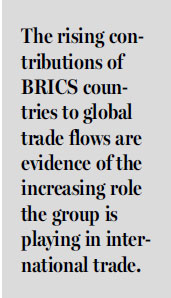Cooperating to encourage global trade
In view of great trade uncertainties facing the global economic landscape, the role of BRICS countries - Brazil, Russia, India, China and South Africa - in sustaining international trade is of paramount importance. It can be safely assumed that BRICS and other multilateral groupings such as the G20 and the World Trade Organization will continue to foster international trade despite the uncertainties arising from the actions of the Donald Trump administration.

This comes as finance ministers and central bank governors from the world's 20 largest economies called for the heightening of bilateral and multilateral discussions to prevent trade and geopolitical tensions from hurting global growth. This happens at a time when the United States and China, the world's two largest economies, don't see eye to eye on a host of trade and trade-related issues.
All the BRICS member countries agreed during the G20 meeting of finance ministers to strengthen multilateral cooperation and uphold economic globalization. Close cooperation between BRICS member states and other emerging and developing countries from the South such as Mexico and Turkey will likely continue to boost global trade, because their growth and that of the global economy rely on active trade interactions and they all oppose protectionist policies. This is because more and more economies, primarily those from the North such as the European Union, Canada and Japan understand that sustainable growth rests on international trade flows.















